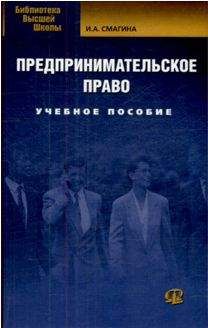Станислав Коростелев - Английский язык для юристов. Предпринимательское право
В обществе с числом акционеров более пятидесяти создается совет директоров (наблюдательный совет).
Исполнительный орган общества может быть коллегиальным (правление, дирекция) и (или) единоличным (директор, генеральный директор). Он осуществляет текущее руководство деятельностью общества и подотчетен совету директоров (наблюдательному совету) и общему собранию акционеров.
List of key terms and word combinations:– cumulative voting – метод голосования акционеров путем сложения голосов по акциям
– derivative suit – производный иск
– direct suit – прямой, непосредственный иск
– insider trading – продажа акций лицами и учреждениями, располагающими конфиденциальной информацией
– managerial control – контроль менеджеров над компанией
– pooling agreements – объединение (напр. прибылей)
– preemptive right – преимущественное право покупки
– proxy – представитель; доверенный; полномочие; доверенность; голос держателя акции, поданный по доверенности или через уполномоченного представителя
– proxy solicitation – ходатайство о представлении доверенности на голосование
– shareholder of record – владелец именной акции, зарегистрированный в книгах компании
– trustee – доверительный собственник; лицо, распоряжающееся имуществом на началах доверительной собственности
– voting trust – аккумуляция в одних руках акций различных лиц на началах доверительной собственности для распоряжения голосами в целях установления контроля над делами компании
The business affairs of a corporation are managed by a board of directors that is elected by the shareholders. The board's responsibility is to take whatever actions are appropriate, in keeping with the corporation's rules and regulations, to further the corporation's business. Individual board members are supposed to use their own judgment in the corporate decision-making process.
Law and corporate rules establish the qualifications that a person must have to be a corporate director.
In general, directors are elected at the annual meeting of the shareholders. The directors of most large corporations meet on a regular basis at a time and place of their choosing. The directors of many smaller corporations meet only when specific items are to be considered. Small corporations having few shareholders can eliminate the board of directors entirely, as long as someone is assigned the duties that the board would have performed.
Directors have the authority to appoint officers and agents to run the day-to-day affairs of the corporation. By statute, the usual officers are a president, several vice-presidents, a secretary, and a treasurer. Other officers, such as a comptroller, cashier, and general counsel are often provided. The bylaws of the corporation describe the duties of each officer. Officers have the authority of general agents for the operation of the normal business of the corporation. They, in turn, delegate duties to various department heads. Although the roles of directors and officers differ, they are frequently assumed by the same people. An individual may be both chief executive officer and chairman of the board of the same corporation.
When the court hears a case challenging a manager's decision, it will turn to one of two rules in judging that conduct: the business judgment rule or the fairness rule. Other areas of managerial responsibility are found in the insider trading rule and the corporate opportunity rule.
Under the business judgment rule, the court will not interfere with most business decisions. The rule protects managers who act with due care and in good faith, as long as their decisions are lawful and are in the best interests of the corporation. The rule results from the common sense belief that, based on their education, experience, and knowledge, managers are in the best position to run the corporation. In contrast, shareholders and judges are far removed from the day-to-day operation of the business and should not be allowed to second-guess most management decisions. Protecting directors and officers in this way encourages people to become corporate managers and reassures them that they will be protected when making difficult business decisions.
The business judgment rule assumes that managers do not personally profit from business decisions. To fulfill a duty of loyalty to the corporation, managers must place the corporation's interests above their own. When managers enter contracts with the corporation or when they are on the boards of two corporations that deal with each other, a different standard is used to judge their conduct. This standard, known as the fairness rule, requires managers to be fair to the corporation when they personally benefit from their business decisions. Managers who benefit from their own decisions are said to be self-dealing. The fairness rule does not automatically declare managers disloyal if they profit from a corporate decision: at a minimum, it requires corporate managers to disclose all crucial information when they enter contracts with the corporation.
Two rules that give the courts specific ways to measure a corporate manager's fairness in certain types of situations are the insider trading rule and the corporate opportunity rule.
According to the insider trading rule, when managers possess important inside information, they are obligated to reveal that information before using it in a transaction. The rule also states that when inside information cannot be revealed, the managers must not use that information when trading with the corporation or with those outside the corporation.
Under the corporate opportunity rule, corporate managers cannot take a business opportunity for themselves if they know that the corporation would be interested in that opportunity as well. Before taking the opportunity, managers must first offer it to the corporation by informing the other managers and shareholders. If the corporation rejects it, the managers are then free to take the opportunity.
The shareholders are the primary reason a corporation exists. They contribute their money to the corporation in the hope of a return on their investment. As owners of the corporation, shareholders can influence corporate decision making through their voting powers (managerial control) and through their right to initiate a lawsuit against managers (corporate democracy).
Shareholders usually receive one vote per share of common stock held. Those who are dissatisfied with management can attempt to buy more shares to increase their voting power and influence the election of the board of directors. However, shareholders are not always able to buy more shares of the corporation either because they cannot afford them or because the other shareholders are not willing to sell. In such cases, shareholders can resort to one of the other voting methods available: cumulative voting, proxy solicitation, voting trusts, pooling agreements, and shareholder proposals.
The system of cumulative voting allows minority shareholders to multiply the number of their voting shares by the number of directors to be elected. All of these votes may be cast for one candidate or may be distributed among several candidates.
A proxy is the authority given to one shareholder to cast another shareholder's votes. Proxy solicitation is the process by which one shareholder asks another for his or her voting right. Proxy solicitation also refers to the document that is actually used to request the right to vote the other shareholders' votes. The minority shareholder's voting power increases as the number of proxies accumulate. Since majority shareholders, including management, can also solicit proxies, a struggle between the two groups, known as a proxy contest, often results.
A voting trust is an agreement among shareholders to transfer their voting rights to a trustee. A trustee is a person who is entrusted with the management and control of another's property or the rights associated with that property. The trustee votes those shares at the annual shareholders' meeting at the direction of the shareholders. Shareholders surrender only their voting rights. All other rights, including the right to receive profits, remain with them.
Sometimes, shareholders join together in a temporary arrangement (known as pooling agreement, shareholder agreement, voting agreement) agreeing to vote the same way on a particular issue. They differ from proxies and voting trusts because the shareholders retain control of their own votes. In this sense, pooling agreements are also the weakest voting arrangement because shareholders can change their votes at the last minute.
Shareholders can sue management to compel a change in direction or to force management to overturn a decision. The two types of suits available to shareholders are direct suits and derivative suits.
A direct suit is brought by shareholders who have been deprived of a right that belongs to them as shareholders to make up for any loss that they have suffered. These rights include the right to vote, the right to receive dividends, the right to transfer shares, the right to purchase newly issued stock, and the right to examine corporate books and records.
A derivative suit allows shareholders to sue corporate management on behalf of the corporation. Unlike a direct suit, a derivative suit is based on an injury to the corporation.
To bring a derivative suit, shareholders must exhaust all internal remedies. Before bringing suit, the shareholder must attempt to solve the problem by communicating with the board of directors and with other shareholders. In addition, in order to bring a derivative suit, a shareholder must own stock at the time of the injury and at the time of the suit. This is known as the rule of contemporary ownership.
The stock certificate is written evidence of ownership in shares in a corporation. A shareholder must have possession of the certificate and must sign and deliver it to the person to whom title is transferred (the transferee, who in turn becomes a shareholder of record) when selling or pledging shares. Loss of a certificate does not take away the owner's title to the shares of stock represented by the certificate. Shareholders' names and addresses are shown on the books of the corporation, and they receive dividends, notices of meetings, and any distribution of shareholder reports.
A shareholder's right by statute to inspect the records of the corporation is usually limited to inspections for proper purposes at an appropriate time and place.
Shareholders have the right to share in dividends after they have been declared by the board of directors. Once declared, a dividend becomes a debt of the corporation and enforceable by law, as is any other debt.
Unless the right is denied or limited by corporate charter or by state law, shareholders have the right to purchase a proportionate share of every new offering of stock by the corporation. This entitlement is known as the shareholder's preemptive right. This right prevents management from depriving shareholders of their proportionate control of a corporation simply by increasing the number of shares in the corporation.
Exercise 1. Comprehension questions:
1. How are the directors elected?
2. What are the requirements to meeting of the directors?
3. Explain the insider trading rule and the corporate rule.
4. Explain the theory of managerial control.
5. Explain the theory of corporate democracy.
6. How can the shareholders influence the elections of the board of directors?
7. Explain the term proxy solicitation.
8. What do shareholder's preemptive rights include?
Exercise 2. Find in the text English equivalents to the following:
Метод голосования акционеров путем сложения голосов по акциям; производный иск; продажа акций лицами и учреждениями, располагающими конфиденциальной информацией; преимущественное право покупки; доверенность; голос держателя акции, поданный по доверенности или через уполномоченного представителя; владелец именной акции, зарегистрированный в книгах компании; доверительный собственник; аккумуляция в одних руках акций различных лиц на началах доверительной собственности.
Exercise 3. Consult recommended dictionaries and give words or phrases to the following definitions:
Исполнительный орган общества; раскрытие информации; одобрение крупной сделки; ревизионная комиссия; аудитор общества; бухгалтерская и финансовая отчетность; совет директоров; общее собрание акционеров; информация об аффилированных лицах.
Exercise 4. Be ready to talk on one of the following topics:
1. Describe the functions of the board of directors and officers of the corporation with regard to the control of corporate affairs.
2. Distinguish between circumstances that call for the application of the business judgment rule and those that call for the fairness rule in the evaluation of management decisions.
3. Judge whether a corporate manager may or may not use inside information in a particular situation.
4. Determine the voting rights of shareholders regarding proxy solicitations, voting trusts, pooling agreements, and shareholder proposals.
5. Contrast shareholder direct suits with shareholder derivative suits and explain the prerequisites for each.




